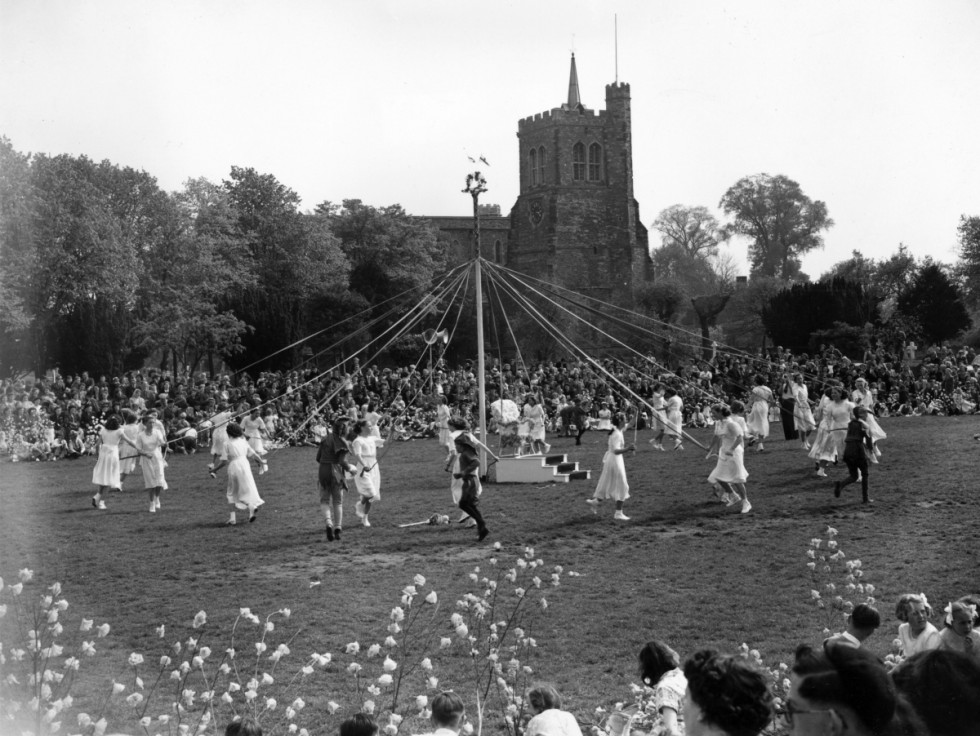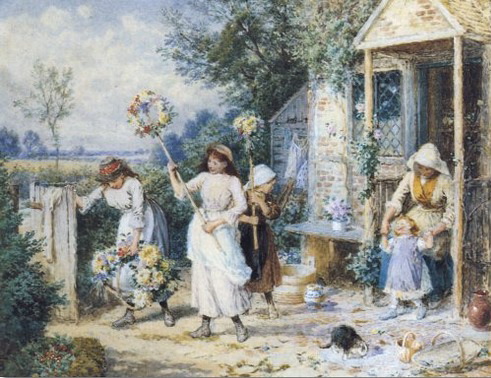MAY DAY SONG IN ENGLAND
Preface (journey through the traditions of Maggio divided by counties)
BEDFORDSHIRE MAY DAY
On 1st May several customs were observed. Children would go garlanding, a garland being, typically, a wooden hoop over which a white cloth was stretched. A looser piece of cloth was fastened at the top which was used to cover the finished garland. Two dolls were fastened in the middle, one large and one small. Ribbons were sewn around the front edge and the rest of the space was filled with flowers. The dolls were supposed to represent the Virgin Mary and the Christ child. The children would stop at each house and ask for money to view the garland.
Another custom, prevalent throughout the county if not the country, was maying. It was done regularly until the outbreak of the First World War and, sporadically, afterwards. Young men would go around at night with may bushes singing May carols. In the morning a may bush was attached to the school flag pole, another would decorate the inn sign at the Crown and others rested against doors, designed to fall in when they were opened. Those maying included a Lord and a Lady, the latter the smallest of the young men with a veil and bonnet. The party also included Moggers or Moggies, a man and a woman with black faces, ragged clothes and carrying besom brushes. (from here)
VIDEO Here is a very significant testimony of Margery “Mum” Johnstone from Bedforshide collected by Pete Caslte, with two May songs

This Morning Is The 1st of May
From the testimony of Mrs Margery Johnstone this May Garland or “This Morning Is The 1st of May” was transcribed by Fred Hamer in his “Gay Garners”
I
This morning is the first of May,
The bright time of the year:
and If I live and tarry here
I’ll call another year
and If I live and tarry here
I’ll call another year
II
The fields and meadows are so green
so green as any leaf
Our Heavenly Father waters them
With His Heavenly dew so sweet
Our Heavenly Father waters them
With His Heavenly dew so sweet
III
A man a man his life’s a span
it flourishes like a flower,
he’s here today and gone tomorrow
he’s gone all in an hour
he’s here today and gone tomorrow
he’s gone all in an hour
he’s here today and gone tomorrow
he’s gone all in an hour
IV
The clock strikes one, I must be gone,
I can no longer stay;
So come downstairs my pretty May doll
and look at my branch of May
So come downstairs my pretty May doll
and look at my branch of May
V
I have a purse in my pocket
It’s drawn with a silken string;
And all it wants is a little money
To line it well within.
And all it wants is a little money
To line it well within.
BEDFORDSHIRE MAY DAY CAROL
[ Roud 305 ; Ballad Index JRSF238 ; Wiltshire 629 ; trad.]
from “Till April Is Dead – A Garland of May“, 2017
“Bedfordshire May Day Carol”, “The May Day Carol” or “The Kentucky May Carol” (as preserved in the May tradition in the Appalachian Mountains) was collected in Bedfordshire.
A first version comes from Hinwick as collected by Lucy Broadwood (1858 – 1929) and transcribed into “English Traditional Songs and Carols” (London: Boosey & Co., 1908).

I
I’ve been rambling all the night,
And the best part of the day;
And now I am returning back again,
I have brought you a branch of May.
II
A branch of May, my dear, I say,
Before your door I stand,
It’s nothing but a sprout, but it’s well budded out,
By the work of our Lord’s hand (1).
III
Go down in your dairy and fetch me a cup,
A cup of your sweet cream, (2)
And, if I should live to tarry in the town,
I will call on you next year.
IV
The hedges and the fields they are so green,
As green as any leaf,
Our Heavenly Father waters them
With His Heavenly dew so sweet (3).
V
When I am dead and in my grave,
And covered with cold clay,
The nightingale will sit and sing,
And pass the time away.
VI
Take a Bible in your hand,
And read a chapter through,
And, when the day of Judgment comes,
The Lord will think on you.
VII
I have a bag on my right arm,
Draws up with a silken string,
Nothing does it want but a little silver
To line it well within.
VIII
And now my song is almost done,
I can no longer stay,
God bless you all both great and small,
I wish you a joyful May.
NOTES
1) the hands become those of God and no more than Our Lady, as in Cambridgshire, the contaminations with the creed of the dominant religion are inevitable
2) this sweet and fresh cream in a glass is a typically Elizabethan vintage-style drink-dessert still popular in the Victorian era, the Syllabub. The Mayers once offered “a syllabub of hot milk directly from the cow, sweet cakes and wine” (The James Frazer Gold Branch). And so I went to browse to find the historical recipe: it is a milk shake, wine (or cider or beer) sweetened and perfumed with lemon juice. The lemon juice served to curdle the milk so that it would form a cream on the surface, over time the recipe has become more solid, ie a cream with the whipped cream flavored with liqueur or sweet wine (see recipes)
3) the reference to the dew is not accidental, the tradition of May provides a bath in the dew and in the wild waters full of rain. The night is the magic of April 30 and the dew was collected by the girls and kept as a panacea able to awaken the beauty of women!! (see Beltane)
NOTES
1) the hands become those of God and no more than Our Lady..
2) Syllabub (see above)
3) the stanza derives from “The Moon Shine Bright” version published by William Sandys in Christmas Carols Ancient and Modern (1833) see
I
A branch of may, so fine and gay
And before your door it stands.
It’s but a sprout, it’s well-budded out,
for the work of our Lord’s hand(1).
II
Arise, arise, you pretty fair maid
And take the May Bush in,
For if it is gone before morning come
You’ll say we have never been.
III
I have a little bird(?)
?…
IV
If not a cup of your cold cream (2)
A jug of your stout ale
And if we live to tarry in the town
We’ll call on you another year.
V(3)
For the life of a man it is but a span
he’s cut down like the flower
We’re here today, tomorrow we’re gone,
We’re dead all in one hour.
VI
The moon shine bright,
the stars give a light
A little before this day
so please to remember ….
And send you a joyful May.
NORTHILL MAY SONG/MAY SONG
Martin Carthy & Dave Swarbrick from “Because It’s There” 1995, ♪ (track 2 May Song)
Martin Carthy writes in the sleeve notes “May Song came from a Cynthia Gooding record which I lost 16 years ago, words stuck in my head.” (from II to VIII)
I
Arise, arise, my pretty fair maids,
And take our May bush in,
For if it is gone by tomorrow morrow morn,
You’ll say we have brought you none.
II
We have been rambling all of the night,
The best(and most) part of this day;
And we are returning here back again
And we’ve brought you a garland gay (brunch of May).
III (1)
A brunch of May we bear about(it does looked gay)
Before the (your) door it stands;
It is but a sprout and it’s all budded out
And it’s the work of God’s own hand.
IV
Oh wake up you, wake up pretty maid,
To take the May bush in.
For it will be gone and tomorrow morn
And you will have none within.
V
The heavenly gates are open wide
To let escape the dew(2).
It makes no delay it is here today
And it falls on me and you.
VI
For the life of a man is but a span,
He’s cut down like the flower;
He makes no delay he is here today
And he’s vanished all in an hour.
VII
And when you are dead and you’re in your grave
You’re covered in the cold cold clay.
The worms they will eat your flesh good man
And your bones they will waste away.
VIII
My song is done and I must be gone,
I can no longer stay.
God bless us all both great and small
And wish us a gladsome May.
IX
The clock strikes one, it’s time to be gone,
We can no longer stay.
God bless you all both great and small
And send you a joyful May.
Magpie Lane from “Jack-in-the-Green” 1998 ( I, II, III e IX) with The Cuckoo’s Nest hornpipe ♪
The song is reproposed in the Blog “A Folk song a Week” ♪ edited by Andy Turner himself in which Andy tells us he had learned the song from the collection of Fred Hamer “Garners Gay”
Fred collected it from “Chris Marsom and others” – Mr Marsom had by that time emigrated to Canada, but Fred met him on a visit to his native Northill, Bedfordshire. Fred’s notes say “The Day Song is much too long for inclusion here and the Night Song has the same tune. It was used by Vaughan Williams as the tune for No. 638 of the English Hymnal, but he gave it the name of “Southill” because it was sent to him by a Southill man. Chris Marsom who sang this to me had many tales to tell of the reception the Mayers had from some of the ladies who were strangers to the village and became apprehensive at the approach of a body of men to their cottage after midnight on May Eve.”

NOTES
1) Kerfuffle
A branch of May we have brought you,
And at your door it stands;
It’s nothing but a sprout but it’s well budded out
By the work of our Lord’s hand.
2) according to the previous religion, water received more power from the Beltane sun. Celts made pilgrimages to the sacred springs and with the spring water they sprinkled the fields to favor the rain.
LINK
https://mainlynorfolk.info/martin.carthy/songs/maysong.html
https://mainlynorfolk.info/shirley.collins/songs/themoonshinesbright.html
https://mainlynorfolk.info/shirley.collins/songs/cambridgeshiremaycarol.html
https://www.hymnsandcarolsofchristmas.com/Hymns_and_Carols/NonChristmas/bedfordshire_may_day_carol.htm
http://www.hymnsandcarolsofchristmas.com/Hymns_and_Carols/moon_shines_bright.htm
http://ingeb.org/songs/themoons.html
https://afolksongaweek.wordpress.com/2012/04/30/week-36-northill-may-song/

![Moggers-Moggies[Z49-685]](https://terreceltiche.altervista.org/wp-content/uploads/Moggers-MoggiesZ49-685.jpg)